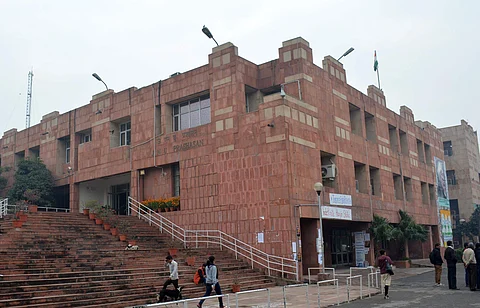

Jawaharlal Nehru University (JNU), which is ranked second in the National Institutional Ranking Framework (NIRF) 2022 is a public central major research university that is also known for its student politics. Having said that, Chancellor VK Saraswat has said that the students have now understood the message — the university is a place for a free exchange of ideas but it cannot be used for activities that are 'anti-national' or against the interest of the nation's sovereignty, as stated in a report by PTI.
Further, the Chancellor, who is also a member of NITI Aayog, said, "It is a free-thinking society there. So, you will find a lot of contradictory thought processes, and a lot of contradictory ideologies, which people will nurture. So, at times, there was a clash of ideologies, that is why you used to hear that there are problems."
Over the years, many instances of violence have happened involving Left-affiliated student outfits and the RSS (Rashtriya Swayamsevak Sangh) student body Akhil Bharatiya Vidyarthi Parishad (ABVP). The most recent incident reported at the varsity is a clash between two groups at the varsity's Kaveri Hostel, allegedly over the serving of non-vegetarian food on Ram Navami in the mess.
Now, sharing views on these types of incidents, Saraswat said, “But we have now given total shape to this that you (students) have the freedom to express yourself, except that any activity which is anti-national, any activity which is against the interest of the nation’s sovereignty, such things should be dissuaded. And that message has been delivered to all concerned. I think, by and large, people have understood."
The Chancellor also stated that the COVID-19 pandemic helped students realise the importance of JNU. As they were limited to studying from home, students realised that the ecosystem of JNU is necessary to be more creative and productive, he added.
To recall several incidents at JNU
Many JNU students and alumni, namely Sharjeel Imam, Umar Khalid, Natasha Narwal and Devangana Kalita, were arrested under the stringent Unlawful Activities (Prevention) Act (UAPA) for their alleged involvement in the 2020 Delhi riots conspiracy case. Although Narwal and Kalita were later released on bail, Khalid and Imam are still in jail.
At a protest in the campus, Kanhaiya Kumar and Khalid, who were then studying at JNU, were arrested by the Delhi Police for alleged involvement in the sedition case in 2016. Later, they were released on bail. On January 5, 2020, a mob of masked men stormed the campus and targetted students in three hostels, unleashing mayhem with sticks, stones and iron rods, hitting inmates and breaking windows, furniture and personal belongings. At least 28 people, including JNU Students’ Union President Aishe Ghosh, were injured as chaos reigned on the campus for nearly two hours.
